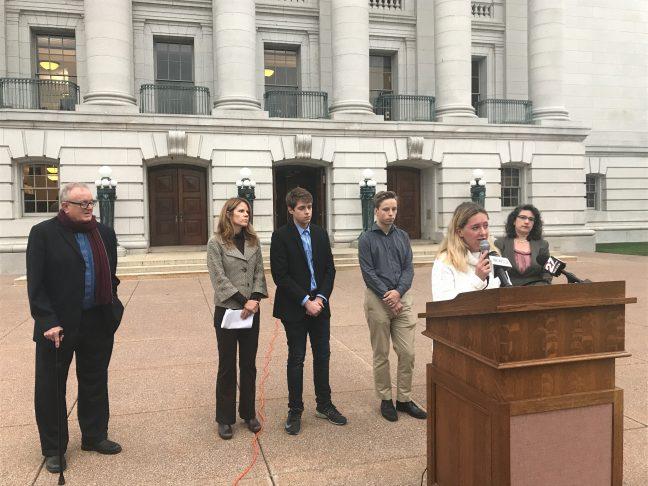In light of the Wisconsin State Senate Judiciary Committee’s decision to pass a bill which would allow for permitless concealed carry, student and governmental leaders held a press conference Wednesday about gun safety on campus.
The speakers were protesting Senate Bill 169, which allows individuals with no concealed carry license to bring guns in public places, including college campuses.
Leaders from the Associated Students of Madison spoke at the press conference, including Legislative Affairs Committee Chair Katherine Kerwin, Student Services Finance Committee Rep. Jordan Madden and University of Wisconsin student Kelly Ward.
The student speakers were joined by Rep. Chris Taylor, D-Madison, Rep. Melissa Sargent, D-Madison and Rev. Jerry Hancock from the Wisconsin Anti-Violence Effort.
Ward began the press conference by relaying a personal story of gun violence from her own life, in which a gunman killed eight people at a church service in suburban Milwaukee. One of the victims was Ward’s childhood friend Bart Oliver, who was 15 when he died.
This event, Ward said, was instrumental in the formation of her attitudes toward gun control policy.
“One of the first things I remembered saying after Bart died was that I hoped that this would never happen to anyone again,” Ward said. “But mass shootings have continued to happen again and again and again because we as a state and a country have not addressed appropriate gun violence prevention policy.”
Ward said Republicans in the state legislature and conservatives like Katie Pavlich, who was hosted Tuesday by UW Young Americans for Freedom, have rejected gun control legislation and put people’s lives in danger in the name of “heritage” and the Second Amendment.
Taylor spoke about the danger which UW students could face if the bill passes the Senate, and said gun control legislation could prevent another mass shooting.
“Bullets and backpacks do not go together — they should never go together,” Taylor said. “Let’s not wait for a shooting on one of our college campuses to occur before we get serious about this.”
In response to individuals who claim gun control legislation violates their constitutional rights, Taylor referenced an 1824 meeting of the University of Virginia board of governors, in which two authors of the U.S .Constitution — James Madison and Thomas Jefferson — were in attendance. At this meeting, the board voted to ban firearms on the University of Virginia’s campus.
The University of Virginia meeting, Taylor said, shows gun control legislation is about protecting public safety, not the Constitution.
In light of Oct. 11 being National Coming Out Day, Madden brought up the disproportionate danger gun violence poses to members of the LGBTQ+ community, particularly trans people and LGBTQ+ people of color.
Additionally, Madden said the issue of gun control is, above all else, an issue of public health.
“I’m here today not to discuss issues of personal liberties, not constitutional clarity, or anything even related to the fundamental principle that ensures your right to a weapon,” Madden said. “I’m here today to address the fundamental public health crisis that we see unfolding before us in America due to actors such as the National Rifle Association and Republicans that refuse to enact common sense gun reform.”
Sargent said the majority of Wisconsinites support gun control legislation, but special interest groups like the NRA have pushed Republicans to vote in favor of gun rights.
Kerwin, who said Wisconsin students and residents are not in support of expanding gun rights, ended the press conference by posing a series of rhetorical questions to the the State Senate’s Judiciary Committee and their decision.
“Who was the Judiciary Committee voting for a few weeks ago?” Kerwin asked. “Were they voting for the students of Wisconsin, who are afraid of campus carry? Were they voting for the parents of small children in K-12 elementary schools? Were they voting for Wisconsin?”


